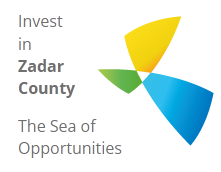1. Proximity of EU countries
Croatia and Zadar County offer a significant advantage, the proximity of the EU market, especially in comparison to the Asian countries whose main competitive advantage lies in their low labour costs. Relative vicinity to the automotive factories in the EU-15 countries, good geographic position and intensive investments in modernisation of infrastructure give domestic producers a great initial advantage.
Apart from lower transportation costs, vicinity to the customers is lately becoming increasingly important, because of the focus on synchronous delivery of parts to customers, according to their daily needs in order to decrease, as much as possible, the storage costs before vehicle assembly.
2. Quality of domestic suppliers is on European Standards level
Majority of domestic suppliers hold all relevant certificates, primarily ISO 9001, but also, more and more the TS16949 certificate. Quality of the products meets high standards set in the automotive industry, which is proven by the fact that most part of the production is exported to the European Union markets. The European level quality and, at the same time, lower labour costs than in other Western Europe countries, are factors creating a significant comparative advantage for Croatia.
3. Strong cooperation of Croatian producers with clients in the area of research, design and planning of new products
Numerous Croatian companies have successfully developed new product lines or services, or upgraded existing ones in past years. Use of AutoCAD and other software for design and development of components is relatively spread in comparison to the situation in other countries of the region.
According to an OECD study, numerous Croatian suppliers already cooperate with their clients in areas which demand deep, stable and medium to long-term business relations, such as product development, product design and production planning. The level of cooperation is much better than in other parts of the region. In addition, majority of the companies use web sites for communication with their clients and regularly participate in on-line public procurement.
All these elements are a clear proof of deep and strong relationships between local suppliers and international clients.
4. Competitive costs and workforce productivity
The Republic of Croatia is still a country with competitive costs compared to EU countries. However, workforce productivity in Croatia is higher than in most countries of Central and Eastern Europe, which is presented in the following graph.
5. Skilled workforce
An important advantage is the quality and availability of highly skilled workforce, or engineers.
6. State support to the development of automotive industry
Although state subsidies are limited in terms of time, since these are direct sectoral state subsidies to producers, they largely contribute to technological modernisation and competitiveness of companies operating in Croatia. CBRD (Croatian Bank for Reconstruction and Development) loans provide additional funds intended for acquiring working capital at favourable terms.
Croatia has a proactive approach to attracting FDI in automotive industry, which include not only tax reliefs, but, also, access to industrial zones and speeding up the procedure of acquiring the necessary licenses.
7. Possibilities for connections with producers in other countries
Good geographic position and globalisation of the automotive production opens for producers in Croatia possibilities to connect with companies in surrounding countries which have significant capacities for production of automotive parts, especially Austria, Hungary, Italy, Slovenia and Romania.
Examples of cross border cooperation already exist, and further possibilities exist for creation of international clusters with producers in Member states and candidate countries. In spite of a high level of industrial rivalry on the international level, current trends in automotive industry force producers to intensify cooperation.
8. Strong tradition
One of the automotive industry crucial heritages in this area is the high level of specific training in automotive sector and availability of skills, including skills which are closely connected with the production of automotive parts, for example metal processing industry, welding, plastic products production, electric equipment production, machine engineering, production of high precision components.
Zadar has a rich and long tradition in metal processing industry. Before Croatian independence, Zadar based companies SAS and BAGAT were among the most successful companies, employing a large number of people and dealing with clients from Germany to Russia. Foreign investors already present in the region pointed out in an OECD study that the presence of skilled workforce in automotive industry was the decisive factor when they selected Zadar county as a location for their investment. According to them, this was not the case in other emerging markets.




